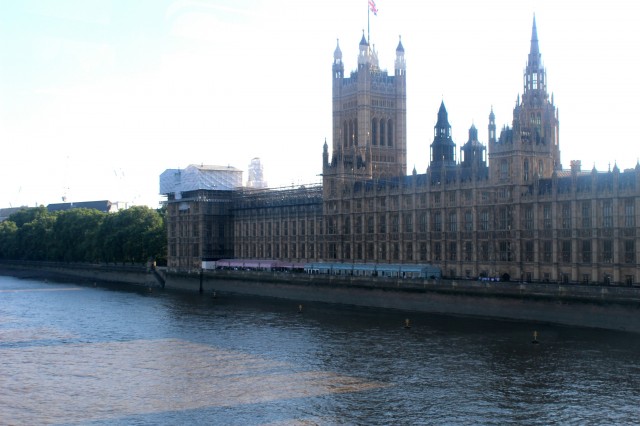BB Bakery Afternoon Tea Bus Tour
Chocablog, 12 August 2014
In case you hadn’t heard, it’s National Afternoon Tea Week here in the UK and we’ve been celebrating in style with an afternoon tea with a difference! Covent Garden based BB Bakery recently bought an old Routemaster double decker bus and converted it into a rather fun venue for afternoon tea – a venue that moves!
As you enjoy your afternoon tea, the BB Bus tours some of London’s famous landmarks, making other commuters with their old-fashioned non-afternoon-tea transportation very jealous indeed!
Of course, eating and drinking in a moving vehicle does present challenges, so this is a little different from the average afternoon tea. Freshly squeezed orange juice comes in little bottles with lids and the tea itself is served in ceramic versions of takeaway coffee cups with rubber lids. The cups fit neatly into recessed cup holders in the tables and (mostly) keep everything quite secure. We did encounter one or two challenging “bumps” in the road, but that was really all part of the fun.
The food was very pleasant, with most of the meal laid out beforehand (being a waiter on a moving bus is another callenge!). There were little sandwiches, savouries and a nice selection of sweet treats to go with the tea, including this tempting little chocolate tart.
But of course, the best part of the experience is watching London go buy while you sit in comfort. There can’t be many afternoon teas where you get constantly changing views like this!
I had a fantastic time on the bus, but there were a few minor issues with it that I’m sure the BB team can resolve in time.
The biggest of those was with the tea. A selection of Tea Pigs teabags was available, which are Ok, but not the greatest teas in the world. A bigger problem was with the cups themselves. Drinking tea through a mug with a rubber lid isn’t a great experience and ends up just making the tea taste of rubber. Milk was presented in those little UHT cartons, so I opted to have mine black and risk drinking it without the lid.
I would have also liked to have had some form of commentary on the tour itself. I like the fact that we were mostly left in peace to eat and chat, but it would have been great to have a few landmarks pointed out.
That aside, the Afternoon Tea Bus Tour is a thoroughly enjoyable experience. By it’s nature, it’s not the most refined afternoon tea experience, but shared with a group it’s a whole lot of fun. The challenge of eating and drinking while moving becomes part of the entertainment.
The BB Bakery Afternoon Tea Bus Tour costs £45 per person. Thanks to AfternoonTea.co.uk for arranging this press trip and organising National Afternoon Tea Week!











 A 16-year-old schoolboy has broken the record for the fastest journey from Land’s End to John O’Groats – by public bus.
A 16-year-old schoolboy has broken the record for the fastest journey from Land’s End to John O’Groats – by public bus.